I am studying long-term trends in Cheatham County’s economy and would love to pick people’s brains for info. To start off my story, here’s a graph of Cheatham County’s unemployment rate (in blue) alongside Tennesseee’s (red). You can see that Cheatham has a lower unemployment rate than the state.
You can see the good times, the bad times, the booms, and the recessions.
I can filter out national- and state-level events by taking Cheatham’s unemployment rate and subtracting Tennessee’s unemployment rate. What’s left shows trends arising from factors inside the county and give us an “x-ray” to see how good or bad the county was doing. It shows that Cheatham has had lower unemployment than the state for decades and that has helped us a lot, but things have been getting steadily worse for almost 20 years, and we’re a few years away from having *higher* unemployment than the state:
(The annotations are my best-guess as to what’s going on, and if you have any better ideas, I’d love to hear them).
From 1990-1995 things were generally going great (except for a ~8 month rough patch between 08/91 – 05/92. What is that? Temporary layoffs at State?). Unemployment was consistently 2-3% lower in Cheatham than the rest of the state, and it was getting even better as time progressed. It was easier to find a job here, and that helped attract a lot of growth to the area. Local employers had to compete a little harder to get workers, which meant higher incomes and better benefits. Times were good.
And then, Something Bad Happened. I’m not 100% certain what It was, other than a few hunches. Between 1996-2000 Tennessee’s unemployment (red) started rapidly falling, while Cheatham’s unemployment rate (blue) stayed the same. That suggests that rather than doing something wrong, we failed to do something right that other counties were doing.
I believe the data is showing the extent to which Cheatham missed out on the dot.com boom. Other counties saw a small explosion in IT-related jobs. They also had other industries (healthcare, entertainment) positioned to reap the benefit from either IT innovation or the general positive economic climate, and they flourished. We didn’t have those (if the economy booms are you going to buy *two* water heaters?), so ours stayed the same. The wind was blowing, but we didn’t have any sails.
In 2001, things got a bit better, at least relatively. Our downhill slide didn’t stop, but at least it started growing worse at a slower rate. Given the timing, my guesses are 1) the bursting of the dot.com bubble affected us less than the rest of the state and/or 2) AO Smith’s acquisition of State put the business on firmer ground. Between 2002-2010, Census data shows job growth in manufacturing, education, healthcare, and arts & entertainment in Cheatham failed to keep pace with the rest of the state.
Part of the drop in the “unemployment gap” can be explained by the blindingly obvious: the number of people available to work (civil workforce grew by 761 between 2002-2010) grew faster than the number of in-county jobs (266 between 2002-2010). There are currently only 2 in-county jobs for every 5 working residents, so Cheatham needs to be working much harder to attract and keep jobs (hello, Red River Industrial Park…)
But another part is the types of jobs available in the county. 82% of residents leave the county for work (I am one of them!), either because they earn more money outside the county or Cheatham doesn’t offer jobs in their field. In-county jobs are increasingly staffed (60% of all in-county jobs today, and growing 1%/yr) by commuters from poorer counties, which itself further hinders job creation by local daytime businesses like restaurants and grocery stores.
As more residents work outside the county, our unemployment rate is going to be a lot more “average” than it otherwise would, and since 60% of the county works in Davidson, it’s no coincidence that our unemployment rate is starting to look a lot like theirs.
While residents earn more money by commuting, it doesn’t do much to help local employment unless they spend it in-county. I don’t recall the last time I left work at Vandy, and drove past Chago’s, Chuy’s, Pei Wei’s, Mirko Pasta, Mellow Mushroom, Genghis Grill, Judge Beans, and Baja Burrito to eat in Cheatham. I usually eat and shop close to work. Unfortunately for the county, so does that other 82%, and as that percentage grows it is becoming more and more a hindrance to local job creation (ask the local restaurateurs about that! It drives home how smart Steve Stratton had to be to stay in business so long).
So there are a number of forces pulling us in the wrong direction. By extrapolating the current trend out, sometime after 2022 it will become *harder* to find a job here than elsewhere in TN.
That will cause people to reconsider moving into the county, increase pressure on existing residents to look elsewhere in search of jobs, and doesn’t bode well for real estate values, incomes, business investment, taxes and government, and a number of other areas. The county’s current trajectory is somewhere between “bedroom community with no kitchen or living room” and “The Grapes of Wrath”.
And then there are the wild cards, like the cost of fuel and technological innovation. If the real cost of oil goes up in a sustained way (and unless you think China and India are going to turn their back on cars and go back to bicycles, it eventually will), some fraction of those 82% of residents who commute will have to take a long, hard look at living closer to work, because there’s no option for them to work closer to where they live. The transportation sector added 156 jobs to the county between 2002-2010, more than any other sector. But what happens to those jobs 10 years from now when self-driving vehicles are a reality? Given the low margins and intense competition in that sector, companies like Re-West will face incredible pressure to automate their rigs and shed jobs.
Now that I’ve blathered on enough, I’d really love to hear your ideas about jobs and unemployment (past, present, or future). What else is going on here? What am I missing? Do you think I’m wrong? Please share your story, your piece of the puzzle, in the form below.

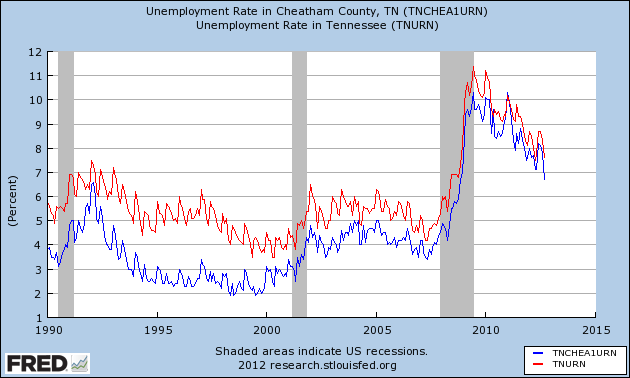
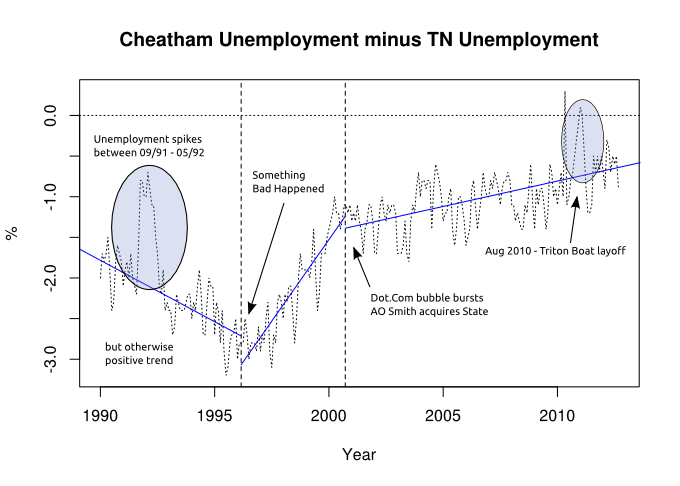
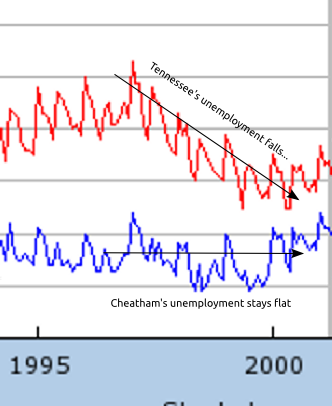
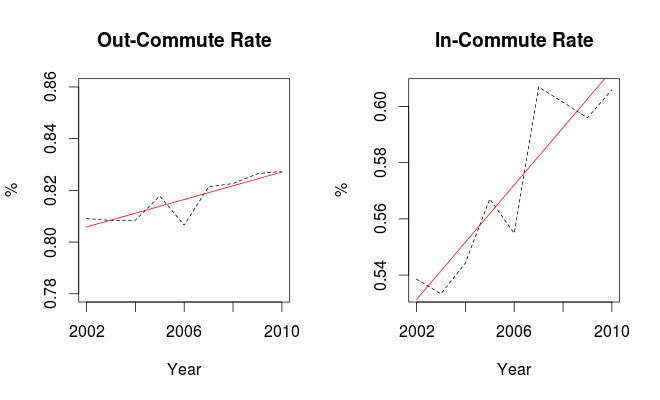
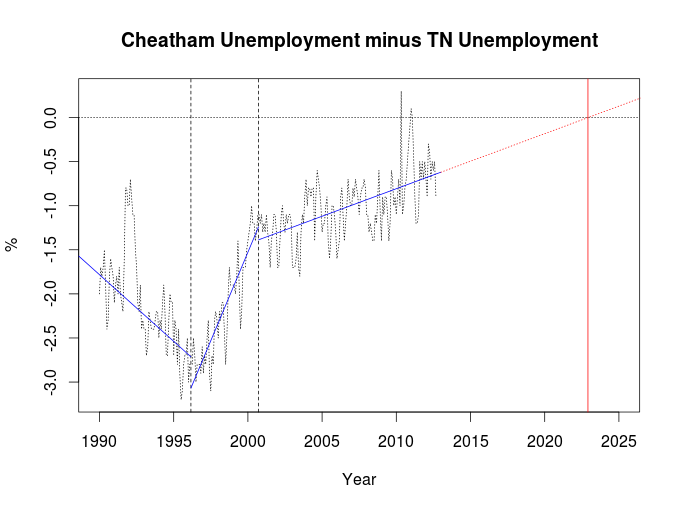
It was interesting going door to door in the last campaign that your employment numbers prove out when talking to people. There are entire subdivisions of commuters.
The commuters seemed to be the higher skilled individuals. It seemed they came to Cheatham County as a quite place to live and be as much a part of a community as they desired.
It will take a major change in the price of oil to move people out of their homes and closer to work given that Nashville has no transit system to speak of other than buses that radiate out of downtown. I, for example, commute to Goodlettsville and there is no way to get to my office by bus without walking the last 3/4 of a mile up a hill.
And if the price of oil moves that much the reaction may be to smaller and smaller cars to make the commute as families are anchored to Cheatham County in many ways.